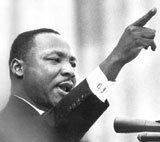口语Festival素材:Dr. Martin Luther King Day(马丁•;路德•;金纪念日)
文章作者 无名 发表时间 2004:12:06 06:07:48
来源 100Test.Com百考试题网
| Dr. Martin Luther King Day | ||||
| Third Monday in January | ||||
It was December, 1955, and Martin Luther King, Jr. had just received his doctorate degree in theology(神学). He had moved to Montgomery( 蒙哥马利), Alabama to preach at a Baptist church. He saw there, as in many other southern states, that African-Americans had to ride in the back of public buses. Dr. King knew that this law violated the rights of every African-American. He organized and led a boycott(联合抵制)of the public buses in the city of Montgomery. Any person, black or white, who was against segregation(种族隔离)refused to use public transportation. Those people who boycotted were threatened or attacked by other people, or even arrested or jailed by the police. After 382 Days of boycotting the bus system, the Supreme Court(最高法院)declared that the Alabama state segregation law was unconstitutional. African-Americans were not only segregated on buses throughout the south. Equal housing was denied to them, and seating in many hotels and restaurants was refused. In 1957, Dr. King founded the Southern Christian Leadership Conference(南 On August 23, 1963, a crowd of more than 250,000 people gathered in Washington, D.C. and marched to the Capitol Building(国会大厦)to support the passing of laws that guaranteed every American equal civil rights. Dr. Martin Luther King, Jr. was at the front of the "March on Washington." On the steps of the Lincoln Memorial(林肯纪念堂)that day, Dr. King delivered a speech that was later entitled "I Have a Dream." The March was one of the largest gatherings of black and white people that the nations capital had ever seen... and no violence occurred. One year later, the Civil Rights Act(民权法案)of 1964 was passed. It was not the first law of civil rights for Americans, but it was the most thorough and effective. The act guaranteed equal rights in housing, public facilities, voting and public schools. Everyone would have impartial hearings(申诉的机会)and jury trials. A civil rights commission would ensure that these laws were enforced. Dr. Martin Luther King, Jr. and thousands of others now knew that they had not struggled in vain(徒劳). In the same year Dr. King won the Nobel Peace Prize for leading non-violent demonstrations. In 1968, Dr. Martin Luther King, Jr. was assassinated while he was leading a workers strike in Memphis, Tennessee. White people and black people who had worked so hard for peace and civil rights were shocked and angry. The world grieved the loss of this man of peace. The Making of a Holiday Dr. Martin Luther King, Jr.s death did not slow the Civil Rights Movement. Black and white people continued to fight for freedom and equality. Coretta Scott King is the widow of the civil rights leader. In 1970, she established the Martin Luther King Jr. Memorial Center in Atlanta, Georgia. This "living memorial" consists of his boyhood home and the Ebenezer Baptist Church, where King is buried. On Monday, January 20, 1986, in cities and towns across the country people celebrated the first official Martin Luther King Day, the only federal holiday commemorating an African-American. A ceremony which took place at an old railroad depot(铁路仓储)in Atlanta Georgia was especially emotional. Hundreds had gathered to sing and to march. Many were the same people who, in 1965, had marched for fifty miles between two cities in the state of Alabama to protest segregation and discrimination of black Americans. All through the 1980s, controversy surrounded the idea of a Martin Luther King Day. Congressmen and citizens had petitioned(请求)the President to make January 15, Dr. Martin Luther King, Jr.s birthday, a federal holiday. Others wanted to make the holiday on the day he died, while some people did not want to have any holiday at all. January 15 had been observed as a public holiday for many years in 27 states and Washington, D.C. Finally, in 1986, President Ronald Reagan declared the third Monday in January a federal legal holiday commemorating Dr. Martin Luther Kings birthday. Schools, offices and federal agencies are closed for the holiday. On Monday there are quiet memorial services as well as elaborate ceremonies in honor of Dr. King. On the preceding Sunday, ministers of all religions give special sermons(布道)reminding everyone of Dr. Kings lifelong work for peace. All weekend, popular radio stations play songs and speeches that tell the history of the Civil Rights Movement. Television channels broadcast special programs with filmed highlights of Dr. Kings life and times. |
相关文章
口语Festival素材:Mardi Gras(四旬斋前的狂欢节)
口语Festival素材:Japanese Childrens Festivals(日本儿童节)
口语Festival素材:Lantern Festival(元宵节)
口语Festival素材:George Washingtons Birthday(乔治•;华盛顿的生日)
口语Festival素材:Dr. Martin Luther King Day(马丁•;路德•;金纪念日)
口语Festival素材:Coming-of-Age Day (Japan)(日本成人节)
口语Festival素材:Spring Festival(春节)
10月30、31日口语考试汇总
口语Festival素材:New Years Day(新年)
澳大利亚华人论坛
考好网
日本华人论坛
华人移民留学论坛
英国华人论坛
